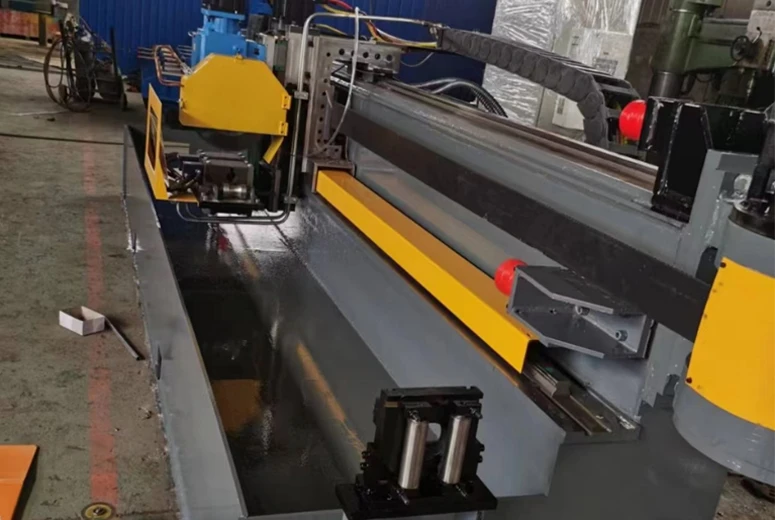aluminium roll forming machine
The Importance of Aluminium Roll Forming Machines in Modern Manufacturing
In the rapidly evolving landscape of manufacturing, aluminium roll forming machines have emerged as crucial tools for producing high-quality aluminium components with precision and efficiency. These machines utilize a continuous bending process to shape aluminium sheets into various profiles, making them indispensable in numerous sectors, including construction, automotive, aerospace, and consumer goods.
Understanding the Roll Forming Process
Roll forming is a continuous process where flat metal strips are fed through a series of rollers. Each roller progressively bends the metal into the desired shape. This process is characterized by its ability to produce long, continuous lengths of a specific profile, which can be cut to size as needed. The flexibility of aluminium makes it an ideal material for roll forming, as it can be manipulated easily while maintaining strength and durability.
One of the key advantages of using aluminium in roll forming is its lightweight nature. Aluminium components significantly reduce the overall weight of products, which is particularly important in the automotive and aerospace industries, where reducing weight can lead to improved fuel efficiency and performance. Additionally, aluminium offers excellent corrosion resistance, making it suitable for a wide range of applications, including those exposed to harsh environmental conditions.
Applications of Aluminium Roll Forming Machines
Aluminium roll forming machines are used to create a diverse array of products. In construction, they are employed to manufacture roofing sheets, guttering, and wall panels that require both aesthetic appeal and structural integrity. These products not only enhance the visual appeal of buildings but also contribute to their durability.
In the automotive industry, roll-formed aluminium components, such as chassis parts and structural reinforcements, are essential for assembling lighter vehicles without compromising safety. The trend towards electric vehicles has further amplified the demand for lightweight materials, positioning aluminium roll forming as a critical technology in the transition to sustainable mobility.
aluminium roll forming machine

Moreover, in the aerospace sector, where performance and precision are paramount, aluminium roll forming machines enable the production of complex shapes needed for aircraft structures and components
. The ability to create long lengths of uniform profiles minimizes the need for welding or joining, which can introduce weaknesses in the material.Advantages of Aluminium Roll Forming Machines
The efficiency of aluminium roll forming machines translates into significant benefits for manufacturers. These machines offer high production rates, which means companies can produce large quantities of materials in shorter timeframes. This efficiency not only reduces labor costs but also decreases waste, as the process is designed to maximize material usage.
Another advantage is the precision with which these machines operate. Roll forming provides tight tolerances, ensuring that the finished products meet exact specifications. This level of precision is crucial in industries where safety and performance are critical.
Furthermore, aluminium roll forming machines are designed for versatility. They can be adjusted to produce different profiles, allowing manufacturers to respond quickly to market demands and changes in design specifications. This adaptability is essential in today’s fast-paced manufacturing environment, where customer preferences can shift rapidly.
Conclusion
Aluminium roll forming machines have solidified their position as vital assets in modern manufacturing. Their ability to shape aluminium into complex profiles with speed and precision has opened new avenues for innovation across various industries. As the demand for lightweight, durable, and corrosion-resistant materials continues to grow, the role of aluminium roll forming machines will only become more significant, driving advancements in technology and materials science. In this dynamic era of manufacturing, embracing the capabilities of these machines is essential for companies aiming to maintain competitiveness and meet the evolving needs of their customers.
-
High Frequency Straight Seam Welded Pipe Production Line-BzZhou Xinghua Machinery Equipment Manufacturing Co., LTD.|Precision Welding, High EfficiencyNewsJul.30,2025
-
High Frequency Straight Seam Welded Pipe Production Line|BzZhou Xinghua|Precision Welding&EfficiencyNewsJul.30,2025
-
High Frequency Straight Seam Welded Pipe Production Line - BzZhou Xinghua|Precision Engineering&EfficiencyNewsJul.30,2025
-
High-Frequency Straight Seam Welded Pipe Production Line-BzZhou Xinghua Machinery Equipment Manufacturing Co., LTD.NewsJul.30,2025
-
High-Frequency Straight Seam Welded Pipe Production Line-BzZhou Xinghua Machinery Equipment Manufacturing Co., LTD.|Precision Manufacturing, High EfficiencyNewsJul.30,2025
-
High Frequency Straight Seam Welded Pipe Production Line-BzZhou Xinghua Machinery Equipment Manufacturing Co., LTD.|Precision Steel Pipe Manufacturing&Industrial EfficiencyNewsJul.29,2025


